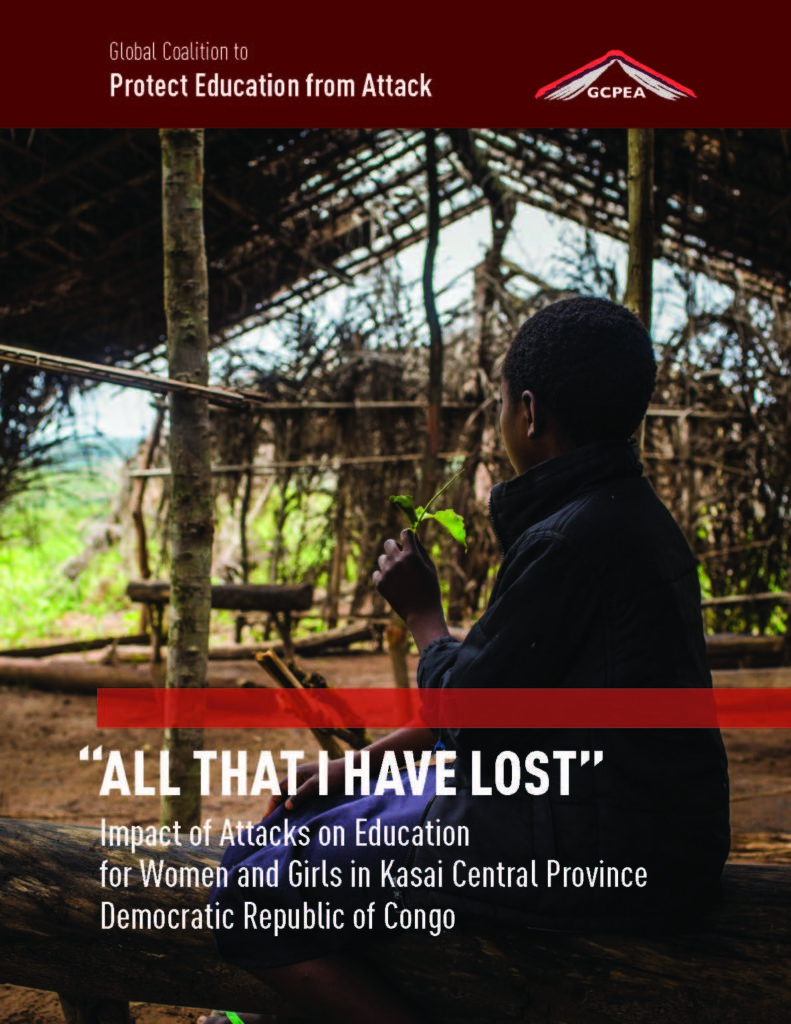GCPEA News
Democratic Republic of Congo: Girls’ Lives Shattered by Attacks on Schools
GCPEA PRESS RELEASE, May 20, 2019
(New York, May 20, 2019) – Armed groups attacked hundreds of schools in the Kasai region of central Democratic Republic of Congo during the 2016-17 conflict, said the Global Coalition to Protect Education from Attack (GCPEA) in a report released today. The violence affected all children, but girls were particularly harmed, used as “magical” forces that would ward off bullets despite being unarmed, and raped and forcibly “married” to troops.
The 76-page report, “‘All That I Have Lost’: Impact of Attacks on Education for Women and Girls in Kasai Central Province – Democratic Republic of Congo,” is based on over 55 interviews with female students, as well as principals, and teachers from schools that were attacked in the region. They describe how militiamen raped female students and school staff when they attacked schools or when girls were fleeing an attack, or abducted girls from schools, purportedly to join the militia, but instead raped or forced them to “marry” militia members. Others were recruited and forced to fight with the militia. Often, they were placed on the front lines armed only with a broom or kitchen utensil, because they were believed to provide magical protection to the whole unit. Many children are believed to have been killed by the Congolese armed forces, including many girls who were being used by the armed groups as human shields.
The Congolese army (Forces armées de la République Démocratique du Congo, FARDC) attacked at least 38 schools in the Kasais and committed other serious violations in the course of suppressing the Kamuina Nsapu militia, including unlawfully targeting civilians and committing summary executions, rape and other abuses. FARDC, as well as the Kamuina Nsapu militia, used schools for military purposes, thereby compromising the civilian status of the schools and making them a legitimate target of attack.
“Young girls were raped, abducted, and recruited during attacks on their schools in the Kasais. Militias believed in girls’ magical powers, and often used them as the first line of defence to rustle their skirts to ward off soldiers with guns,” said Diya Nijhowne, GCPEA’s Executive Director. “There is a critical need to protect schools from becoming sites of extremist violence, particularly against girls.”
Women and girls continue to suffer from the aftermath of the violence in the Kasai region. Although both boys and girls had their education interrupted, girls often found it more difficult to return to school, GCPEA found. The conflict exacerbated the precarious economic situation of many families in the region. When unable to pay for all their children to attend school, parents often prioritized their sons’ education. Families are also more likely to keep their daughters home because of fears for their safety and the risk of sexual violence. Moreover, the severe stigma of rape prevents victims from returning to school, and those who do face social exclusion.
Other long-term consequences of sexual violence include gynecological problems, such as sexually transmitted infections, and pregnancy.
Being out of school, even for relatively short periods, increases the risk of early marriage for girls. Once married, girls often find it difficult to return to school because of household responsibilities, opposition from their husbands, or early pregnancy, with its accompanying host of health risks.
Girls and women have the right to education without fear of abduction, recruitment, or sexual violence. Even in the context of an active conflict, governments can take steps to reduce harm to students, including by endorsing the Safe Schools Declaration and implementing it in a way that responds to the particular needs of women and girls. GCPEA offers some guidance on how this can be done.
The Safe Schools Declaration is an intergovernmental political commitment to protect students, teachers, schools, and universities from attacks by armed forces and armed groups, as well as to restrict military use of educational infrastructure. The declaration includes a range of commitments, linked to specific, concrete actions that can reduce the risk of attack and mitigate their impact. Since May 2015, 87 countries from all regions of the world have endorsed the Safe Schools Declaration, including the Congo.
Attacks on education have a devastating impact wherever they occur. In the past five years, GCPEA has documented more than 14,000 attacks in 34 countries it has found to have experienced a systematic pattern of attacks on education. Armed forces and armed groups were also reportedly responsible for sexual violence in educational settings, or along school routes, in at least 17 countries, including the Congo, during the same period.
On May 27-29, 2019, the government of Spain will host the Third International Conference on Safe Schools, which will provide an opportunity for states to showcase the progress they have made in implementing the Safe Schools Declaration. Attendees will consider how women and girls may be differently impacted by attacks on education, and how the Declaration can be better used to meet their needs.
“As governments gather in Spain, the targeting of girls and women for sexual violence during attacks on schools in the Congo’s Kasai region should serve as a grim reminder of the need to be particularly vigilant about protecting girls’ education,” said Nijhowne. “The Safe Schools Declaration is a tool that countries should endorse and use to protect women and girls and their right to education.”





